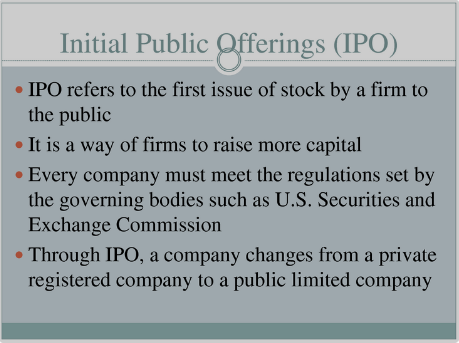Securities laws play a crucial role in regulating Initial Public Offerings (IPOs) and capital raising activities. These laws are designed to protect investors, ensure market integrity, and promote transparency in the process of going public. While specific regulations vary by jurisdiction, many countries have similar frameworks. Below are key aspects of securities laws related to IPOs and capital raising:

1. Registration and Regulatory Approval:
a. Securities and Exchange Commission (SEC) in the United States:
- In the U.S., companies must register their securities with the SEC before making an IPO. The registration statement provides detailed information about the company’s business, financials, and management. The SEC reviews the filing for compliance with disclosure requirements.
b. European Securities and Markets Authority (ESMA) in the European Union:
- In the EU, companies may follow the prospectus regulation, and a prospectus must be approved by the relevant national competent authority or ESMA before an IPO. The prospectus discloses essential information for investors.
2. Disclosure Requirements:
a. Financial Information:
- Companies are required to provide detailed financial statements and other relevant financial information. This ensures investors have a comprehensive understanding of the issuer’s financial health.
b. Business Information:
- Companies must disclose information about their business operations, risk factors, competitive landscape, and management. This information helps investors make informed decisions.
3. Underwriting and Distribution:
a. Underwriting Agreements:
- Companies often engage underwriters to facilitate the IPO. The underwriting agreement outlines the terms and conditions of the underwriting, including the offering price and the number of shares to be issued.
b. Marketing Restrictions:
- Securities laws may impose restrictions on the marketing and promotion of the IPO to ensure that information is presented in a fair and balanced manner.
4. Lock-Up Periods:
- To prevent insiders from selling their shares immediately after the IPO, securities laws may impose lock-up periods during which certain shareholders, such as company executives and early investors, cannot sell their shares.
5. Continuous Disclosure:
- After the IPO, companies are typically subject to ongoing reporting obligations, including regular financial reporting and disclosure of material events. This ensures that investors have updated information on the issuer’s performance.
6. Securities Exchanges:
a. Listing Requirements:
- Companies seeking to go public must meet specific listing requirements of the stock exchange where they intend to list. Exchanges have their own set of rules and regulations that issuers must comply with.
b. Oversight:
- Exchanges play a role in overseeing listed companies’ compliance with ongoing disclosure requirements and other relevant rules.
7. Legal Liability and Investor Protections:
- Securities laws often provide investors with legal remedies in case of misstatements or omissions in the offering documents.
8. Global Offerings:
- For international offerings, companies must comply with the securities laws of each jurisdiction where they plan to issue securities. Coordination with regulatory authorities is essential.
9. Emerging Trends:
- Regulatory frameworks may evolve to address emerging trends, such as the use of new technologies (e.g., blockchain) or changes in market structures.
10. Post-IPO Compliance:
- Companies are expected to comply with post-IPO requirements, such as regular financial reporting, adherence to corporate governance standards, and compliance with insider trading regulations.
It’s crucial for companies planning an IPO to work closely with legal and financial advisors to navigate the complex landscape of securities laws, ensuring compliance and a successful public offering. Additionally, staying informed about updates and changes in securities regulations is essential for ongoing compliance.
